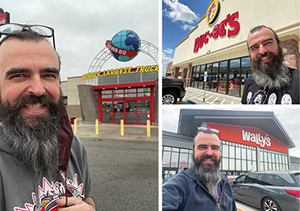 Scott Stratten knows firsthand the lesson he wants to share during his keynote presentation at the NACS Show: There is no neutral brand experience.
Scott Stratten knows firsthand the lesson he wants to share during his keynote presentation at the NACS Show: There is no neutral brand experience.
To prove it, he will tell a tale of what he experienced at a Sheetz convenience store where he recently stopped while driving through Pennsylvania. When he walked into that Sheetz, he was immediately greeted by a salesclerk, who looked him in the eye and in a friendly voice offered: “Welcome to Sheetz!”
As far as Stratten could remember, that was the first time in years that he’d actually been greeted just for walking into a store. It was 2 p.m., but Stratten had his heart set on a croissant, bacon and egg breakfast sandwich. He walked up to the touchscreen kiosk confident that he could still get it because he knew that Sheetz sells breakfast items all day. After he ordered it, a message on the screen asked if he’d like a side order of hash browns. He did. And he requested it. At that moment, he says, the kiosk asked him a follow-up question that flabbergasted him:
“Would you like your hash browns on the side or placed inside the sandwich?” “That’s the moment I fell in love with the brand,” he said. “I stood there laughing out loud at the screen. They not only knew that I was secretly planning to put the hash browns inside my sandwich—but they offered to do it for me.”
Unleadership means trying to remove yourself from the pedestal of power."
DEFYING NORMS
Small actions can have big results. Truly great leaders—who Stratten refers to as “unleaders” because they defy traditional norms—know this. These unleaders, he says, have the unique ability to clearly view their companies and themselves from the perspective of the employees on the front lines, not those on the top. These are the leaders who truly understand that whether you run a multiunit convenience store chain or you’re a single-store owner, your actions on everything from saying hello to the customers who walk into your store to offering food options that will surprise and delight them can make all the difference in customers becoming regulars or one-timers.
It’s never been more important than right now to have that special insight of an unleader. In a world still recovering from more than two years of pandemic-related confusion and stress, an economy hobbling toward recession and a political environment supercharged with partisan divide, it’s critical for simple actions like a trip to the c-store to not only be worry-free but pleasurable. At the NACS Show October 1-4 in Las Vegas, Stratten’s keynote speech will remind the expected 24,000 attendees that unleadership may be their key to success going forward.
“Unleadership means trying to remove yourself from the pedestal of power,” said Stratten. That’s because most leaders never really experience the true culture of their companies because virtually everything is filtered before they see it. If a store knows that an out-of-town owner is planning to visit, for example, it will be cleaned up before the owner arrives, and everyone will be on their best behavior.
Remember, your store branding is only as good as the next day’s Reddit post or TikTok video."
That’s why, says 47-year-old Stratten, there are two critical elements to success as an unleader: self-awareness and empathy. These are the kinds of things that have long been viewed as secondary soft skills—almost as if they weren’t required. Well, the pandemic came along and instantly changed all that.
If nothing else, he says, the pandemic has taught successful unleaders to listen to employees. That requires making time for the conversations and doing a lot more listening than talking. For example, he says, you might have a rule in your c-store that store clerks can’t sit during their shifts. But what about the clerk who might suffer, say, an issue with sciatic nerves and feels leg pain when standing too long without sitting? That’s where you need to listen to employees and find flexibility because customers will instantly see and hear how your workers are being treated. “Remember, your store branding is only as good as the next day’s Reddit post or TikTok video,” he said.
UNMARKETING
 Stratten is no stranger to NACS. He gave a rousing keynote speech to the 2019 NACS Show audience about "Unbranding."
Stratten is no stranger to NACS. He gave a rousing keynote speech to the 2019 NACS Show audience about "Unbranding."
Stratten is no stranger to NACS. Back in 2018—before the COVID-19 pandemic was so much as a flicker of a concept—he gave a rousing keynote speech to the NACS Show audience about “Unbranding.” That means that every single sale you make—even if it’s just for a pack of chewing gum—influences the customer’s overall perception of your brand. “Each visit sells the customer’s next visit to your convenience store,” said Stratten. “Each interaction leads to the next one.”
Stratten is arguably best-known for the concept that is also the name of the company he owns: UnMarketing. Unmarketing, he says, is what happens when you stop marketing and start engaging. Unmarketing is when you focus on building trust and connection, so when your market needs your product or service, you are the logical choice.
Stratten founded his company in 2002 on the belief that folks can build a better business world based on integrity, community and authenticity. In other words, sell who and what you really are and not what your marketing says you are. Together, Scott and his wife, Alison, have taught their unconventional practices to thousands of people worldwide and are co-authors of six bestselling business “unbooks” including “Unmarketing,” “Unselling” and “Unbranding.” Stratten says that their seventh book will likely share the very same title as his upcoming NACS Show speech: “Unleadership.”
Unleadership, however, can take place at many levels of the company—not just the CEO. Truly successful unleaders, whether they are shift leads, store managers or regional managers, are successful because folks choose to follow them because they admire how they lead—not just because of their job title. This is typically related to the personality, experience, attitude and wisdom of that person.
If front-line workers feel comfortable, safe and valued, they can make all the difference in store culture."
SAFE AND VALUED
The best unleaders, Stratten says, are those who spend the most time listening to future unleaders, who are typically their line workers. If front-line workers feel comfortable, safe and valued, they can make all the difference in store culture. A c-store that is staffed by three happy employees can be wildly successful. These upbeat employees not only will likely continue to work for the store with positive attitudes but also will help to attract positive-thinking future employees, he says.
Great unleaders also encourage their employees to cement deep friendships. That’s because employees who get along well are much more likely to watch out for each other. If you have a friend at work, for example, you’re likely to cover for that friend when they’re not available—as they will for you, says Stratten.
But when employees don’t get along—or have issues between them—it’s particularly important for the best unleaders to listen and respond. If you ignore the problem, it will only fester, says Stratten. “You don’t leave a job because of a bad coworker. You leave a job because of a manager who does nothing about it,” said Stratten.
Successful unleaders never talk negatively about any staff members behind their backs.
“That’s showing bias and favoritism and can only lead to a toxic work environment,” he said.
At the same time, the pandemic has changed the equation about what qualities make the best unleaders. It was once widely believed that the very best unleaders were those who were 100% customer-focused.
But the pandemic changed the way some customers treat employees. For example, some customers will blow up at any c-store employee who asks them to wear a mask. But no customer has the right to abuse any of your employees, says Stratten. And employees need to see and feel this in action. If any customer is abusive toward your staff, that customer must be told—in no uncertain terms—to leave and not come back. “Protecting your employees must come first,” said Stratten.
 Stratten and his wife, Allison, teach their unconventional wisdom to people worldwide and have written six bestselling "unbooks" together.
Stratten and his wife, Allison, teach their unconventional wisdom to people worldwide and have written six bestselling "unbooks" together.
Stratten is mindful that most c-store owners do not run big chains, but, instead, own only one or two stores. Key to their success, he says, is to embrace that small size and use it to their advantage. For example, you may have a store in Gainesville, Florida, where the University of Florida plays football. As an independent store owner, you might decide to embrace that local connection and encourage employees to wear Gator-themed clothing and even sell lots of Gator merchandise. A larger chain store might have to request permission from corporate to do such things.
In the end, acts of kindness can go a long way for any unleader at any level.
Stratten practices this daily. Nevermind that he and his wife have five kids. They also have three cats and two dogs—all of them rescues who started out as foster pets and all of which they kept. The couple’s life goal is to open their own animal sanctuary—and there’s little doubt that they’ll accomplish that.
Effective leaders don’t achieve success by accident. Part of it is in the positive actions they take to help others. The very best unleaders, Stratten says, are not self-defined but defined “by who chooses to follow you.”
Any leader can sell a breakfast sandwich. But only an unleader will sell it 24/7—then ask if you want your hash browns stuffed inside of it.
Unlead, and they will come.